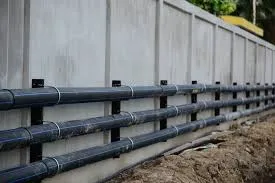Nov . 23, 2024 15:40 Back to list
High-Density Polyethylene Pipe Solutions for Efficient Drip Irrigation Systems
HDPE Pipe for Drip Irrigation A Sustainable Solution for Water Management
Drip irrigation is one of the most efficient methods of watering crops, and its effectiveness has made it increasingly popular among farmers and agriculturalists worldwide. Central to this advanced irrigation technique is the use of high-density polyethylene (HDPE) pipes, which play a crucial role in delivering water directly to plant roots. In this article, we will explore the benefits of HDPE pipes for drip irrigation and their significance in sustainable agriculture.
What is HDPE?
High-density polyethylene (HDPE) is a type of plastic that is known for its high strength-to-density ratio. This material is widely used in various applications, including packaging, automotive parts, and construction. In the context of agriculture, HDPE is favored for its durability, chemical resistance, and lightweight characteristics. HDPE pipes are designed to endure harsh environmental conditions, making them ideal for long-term use in irrigation systems.
Key Benefits of HDPE Pipes in Drip Irrigation
1. Durability and Longevity HDPE pipes are highly resistant to corrosion, abrasions, and impact. They can withstand sunlight, chemicals, and various environmental stresses, ensuring a long service life. This durability reduces the need for frequent replacements, making HDPE pipes a cost-effective solution for farmers.
2. Efficiency in Water Management Drip irrigation aims to minimize water wastage by delivering water directly to the roots of plants. HDPE pipes are designed to maintain optimal water pressure, preventing leaks and ensuring that plants receive the necessary moisture when they need it most. This precision in water application significantly conserves water resources, which is especially vital in arid regions.
3. Reduced Labor Costs The installation and maintenance of HDPE pipe systems are relatively straightforward, allowing for quick setup and efficient repairs. This ease of use translates into reduced labor costs for farmers who can operate irrigation systems with minimal manual intervention. Additionally, advancements in technology have led to the development of automated systems that further enhance efficiency.
hdpe pipe for drip irrigation

4. Versatile Applications HDPE pipes are versatile and can be used for various irrigation systems, including surface-drip and subsurface-drip irrigation. Their flexibility allows them to be installed in different configurations according to the specific needs of crops and soil types. This adaptability is essential for diverse farming practices and helps in optimizing water use in different agricultural settings.
5. Environmental Benefits Using HDPE pipes contributes to sustainable practices in agriculture. By promoting efficient water use, these pipes help reduce the overall demand for water, which is critical in regions facing water scarcity. Furthermore, the longevity of HDPE pipes minimizes material waste, aligning with environmental conservation efforts.
Challenges and Considerations
Despite their numerous advantages, farmers should consider certain challenges when using HDPE pipes for drip irrigation. Initial installation costs can still be a barrier for some, particularly in developing countries. Educating farmers about the long-term savings and benefits of HDPE systems is crucial to overcoming this challenge.
Additionally, proper planning and design are vital for optimizing the performance of HDPE pipe systems. Factors such as soil type, crop requirements, and local climate conditions should be taken into account to maximize the effectiveness of drip irrigation.
Conclusion
HDPE pipes are a game-changer in the realm of drip irrigation, offering numerous benefits that promote efficient water management and sustainable agriculture. As water scarcity becomes an increasingly pressing issue globally, the adoption of HDPE pipes in irrigation systems will play a pivotal role in enhancing agricultural productivity while conserving vital resources. By investing in this innovative technology, farmers can not only improve their yields but also contribute positively to the environment, ensuring a sustainable future for generations to come.
-
Premium CPVC Sheet: High-Temp & Chemical Resistant Solutions
NewsAug.15,2025
-
Durable PPR Pipe for Hot & Cold Water Systems - Easy Install
NewsAug.14,2025
-
Durable HDPE Sheet | Versatile & Impact-Resistant Plastic
NewsAug.13,2025
-
Premium PVC Soft Sheets: Clear, Flexible & Durable
NewsAug.12,2025
-
Premium PVC Round Rods: Durable, Chemical Resistant, Easy to Machine
NewsAug.11,2025
-
PP U-channel: Chemical-Resistant, Lightweight & Durable
NewsAug.10,2025

